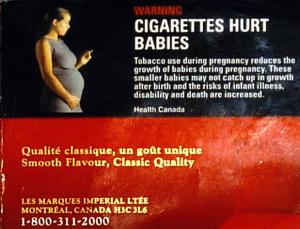Tobacco Companies Ordered to Pay C$15.6 Billion to Quebec Smokers
JUSTICE, 15 Jun 2015
Richard Smallteacher, CorpWatch – TRANSCEND Media Service
4 Jun 2015 – Over one million people in the Canadian province of Quebec will receive a total of C$15.6 billion ($12.5 billion) in damages for smoking related diseases from three of the biggest tobacco companies in the country. The settlement is the result of a 17-year long court battle.
Imperial Tobacco Canada was ordered to pay C$10.5 billion ($8.4 billion), Rothmans, Benson & Hedges, a subsidiary of Philip Morris, was told to pay C$3.1 billion ($2.5 billion) and Japan Tobacco International-Macdonald has to pay C$2 billion. ($1.6 billion)
The lawsuits were initially brought by two individual smokers – Cecilia Letourneau and Jean-Yves Blais – in 1998. Blais died of lung cancer in 2012, the same year that the courts began hearing the case.
“When my husband started smoking in the 1950s at the age of 10 he didn’t know the risks linked to cigarettes,” said his widow, Lise Blais, in a press statement. “He tried several times to stop smoking but never succeeded.”
The court heard from 78 witnesses and reviewed more than 43,000 documents. The tobacco companies tried to claim that Canadians were aware of the problems associated with smoking. Imperial Tobacco cited a 1963 Gallup poll that estimated 96 percent of Canadians were aware of the health risks of tobacco use.
Activists disagreed. “What these historians miss is all the coverage that came out in the media about how the industry was involved in a conspiracy to hide all that information,” François Damphousse, Quebec director of the Non-Smoker’s Rights Association, told the Canadian Broadcasting Corporation. “They knew about the health effects of their products, but they didn’t meet the obligation to inform their public about what they knew.”
And the company’s own internal documents undermined its arguments. “The only remaining ‘benefit’ of cigarette smoking is the psychological assist it provides in terms of stress reduction,” Bob Bexon, a former marketing director of Imperial Tobacco, wrote in the mid-1980s. “If our product was not addictive we would not sell a single cigarette next week in spite of these positive psychological attributes.”
Imperial Tobacco is “the industry leader on many fronts, including that of hiding the truth from – and misleading – the public,” wrote Quebec superior court justice Brian Riordan in his final 276-page judgment ordering the companies to compensate smokers. “If the companies are allowed to walk away unscathed now, what would be the message to other industries that today or tomorrow find themselves in a similar moral conflict?”
“It was long, it was really long for the victims. Many of them died during the trial,” Mario Bujold, executive-director of the Quebec Council on Tobacco and Health, told the Globe and Mail newspaper. “I think that’s the saddest thing – justice takes time, but we’re near the end, so we’re happy about that.”
The companies have vowed to fight on. “There are strong legal grounds with which to challenge both the overall judgment and to seek a stay of the provisional execution order, which Imperial Tobacco Canada will do within 30 days of the original 27 May ruling,” the company said in an official statement.
“We will vigorously appeal this lower court’s judgment, and believe that we have very strong legal grounds to overturn the judgment in its entirety,” an RBH spokeswoman told the Guardian newspaper.
“JTI-Macdonald Corp fundamentally disagrees with today’s judgment and intends to file an appeal,” JTI-McDonald said in a statement. “The company strongly believes that the evidence presented at trial does not justify the court’s conclusions.”
But the companies are facing more lawsuits now. In 2009, the Canadian province of Ontario, brought a C$50 billion lawsuit against them. “Taxpayers of the province of Ontario have paid a lot of money for health-care costs directly related to tobacco use over the decades,” Chris Bentley, the Ontario attorney general, told reporters. “This is more than about money. It’s about justice,” Michael Perley, executive director of Ontario Campaign for Action on Tobacco, added.
And six other provinces have formed a consortium – British Columbia, Manitoba, Nova Scotia, New Brunswick, Prince Edward Island and Saskatchewan – to pursue the tobacco companies.
Go to Original – corpwatch.org
DISCLAIMER: The statements, views and opinions expressed in pieces republished here are solely those of the authors and do not necessarily represent those of TMS. In accordance with title 17 U.S.C. section 107, this material is distributed without profit to those who have expressed a prior interest in receiving the included information for research and educational purposes. TMS has no affiliation whatsoever with the originator of this article nor is TMS endorsed or sponsored by the originator. “GO TO ORIGINAL” links are provided as a convenience to our readers and allow for verification of authenticity. However, as originating pages are often updated by their originating host sites, the versions posted may not match the versions our readers view when clicking the “GO TO ORIGINAL” links. This site contains copyrighted material the use of which has not always been specifically authorized by the copyright owner. We are making such material available in our efforts to advance understanding of environmental, political, human rights, economic, democracy, scientific, and social justice issues, etc. We believe this constitutes a ‘fair use’ of any such copyrighted material as provided for in section 107 of the US Copyright Law. In accordance with Title 17 U.S.C. Section 107, the material on this site is distributed without profit to those who have expressed a prior interest in receiving the included information for research and educational purposes. For more information go to: http://www.law.cornell.edu/uscode/17/107.shtml. If you wish to use copyrighted material from this site for purposes of your own that go beyond ‘fair use’, you must obtain permission from the copyright owner.
